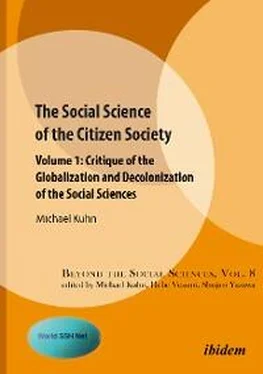One must therefore conclude from the fact that the social sciences today proclaim the necessity of globalization that it took 200 years of social science thinking in the imperial world before, with the decolonization and transformation of colonized societies into state-constructed societies, a social world beyond the imperial world of states was discovered.
And this discovery also reveals what social science thinking is coming to terms with the nature of the formation of state societies in the imperial world of states. As if the emergence of imperial states was not the result of their colonial oppression and exploitation of the world, an exploitation of the colonized world which created the economic foundations for the economic wealth and political power of the imperial world in the first place, as if the creation of a world of states and their imperialism subjecting the social world to their domination purposes was not the way to build and live the world of nation-states, the social sciences realize, more precisely, the social sciences in the imperial world, the existence of a social world beyond their own national societies, and this only then and because and only after the science policies of their imperial states have discovered science as a new lever for global competition for economic growth and for global political power and therefore also drive the social sciences to extend their activities to the social world beyond their national societies. The fact that it was indeed the national science policies in the imperial states that, together with science as a whole, had to motivate the social sciences to do more international work tells all about the thinking about the social world in the social sciences of the imperial states of the world. It obviously needed and still needs such political instructions so that after 200 years of the social sciences, social science thinking can discover an era of “globalization”, almost as if the world until then had consisted of national social biotopes sealed off from one another and having nothing to do with one another. 3
For the social sciences, especially in the imperial states, their discovery of the existence of a social world beyond their national societies, after their politics have pushed them there, is therefore still a trip to an in this sense categorically exotic elsewhere. Despite all the debates about the necessity of globalizing or internationalizing social science thinking, the essential part of social science theory production continues to produce knowledge that not only continues to cultivate the unworldly notion of theories about nationally isolated societies as the basis of its theorizing, but that also continues to produce social science knowledge that arises from perspectives that interpret everything social through the particular, mostly historical, forms of the construction of nationhood of the imperial world of states and, as will be shown later, bring in these nationally constructed theories from the imperial societies as their contribution to their globalization. Theories which, in their search for explanations for social phenomena of national societies, encounter the necessity of having to study the world of states, or which even recognize the phenomena practically defined by state sovereignty as practices of national politics and in order to do so therefore direct their social-scientific thinking towards the world of states as a whole, elsewhere also called imperialism, remain an exception and enjoy a reputation of scientific exoticism, despite, or rather because of, all the debates about a “globalization” of the social sciences. And that this, the nationalization of social science thinking, that this is what constitutes its “globalization”, will be shown later along the products of its “globalized” theory-building.
Less inspired by their intellectual curiosity about what is happening in the world, not to mention the discovery of theoretical necessities to be able to understand social phenomena only by thinking about them as an imperially made world, social sciences that are challenged and urged by their national political elites, of course not to analyze the social world as a whole beyond the national islands, but to participate in presenting the national knowledge resources as an attractive resource for investment seeking global capital, this rather mundane task, to prepare science as a source for international business investment, to present this as a new challenge of a discrete “globalization” as a virtually purposeless, purely scientific, self-critically presented imperative of a globalization of the social sciences, cleansed of all political and economic calculations, reveals nevertheless that the theoretical preoccupation with a nation-state constructed world beyond the individual nation-state societies is obviously a hitherto unknown phenomenon and field of activity for the social sciences, especially for the social sciences in the imperial world of states beyond the USA.
Consequently, and this is the next paradox of “globalized thinking”, the internationalized or globalized social science knowledge that deals with the newly discovered world of states consists, as before, of always nationally constructed knowledge: The most common way of reflecting on the newly discovered global social, which comes to mind in social science thinking, consists of comparing nationally constructed units of knowledge about social phenomena that are always a priori strictly nationally defined. From this it must be concluded that the social sciences, confronted with the task of dealing with the world beyond their theoretical constructs of a world of social phenomena sealed off by the state, simply cannot think of anything else to reflect on the world other than to multiply what they have always done, that is to theorize about a multiplicity of societies always presented nationally, that this thinking about the world of state societies is thus only able to imagine these comparisons as the mere parallel existence of nationally constructed theories. Just as if it were not the interrelationship of states that makes societies within states what they essentially are, when the social sciences look at the world of states comparatively, nothing else seems to come to their mind but to additively juxtapose theories about individual state phenomena, just as if these state societies of the world of states had nothing to do with each other.
Next to the discourse on the “globalization” of social science, there is another worldwide discourse, again 50 years later than the transformation of the colonized parts of the world into nation states and market economies, the discourse on the “de-colonization” of the social sciences, which is opposed by social scientists from the so-called developing countries to the discourse on “globalization” and in which these scientists insist that social science thinking, which creates its theories about the social world from the perspective of the imperial world, is an image of the world that only social sciences can develop in the imperial world.
In fact, for social sciences in countries where there is not a single social phenomenon that does not derive its characteristics from the dependence of these countries on the imperial world, it must be a strange idea of that “zombie” science which assumes that the social in a country could be thought of as an entity untouched by the world of states and which is only able to register the social world beyond its nationally defined societies after these in turn have become state societies.
From the point of view of thinking about the societies in these countries, which are formally also nation-state societies, but which are nation-state societies in which the political as well as economic substance of their societies is under the command of imperial states and which are entirely constructed to serve the imperial states, one might think it must be, at any rate, that it is a strangely illusionary idea to want to imagine their societies as societies exclusively shaped by an individual state and untouched by other states, just as the social science globalized thinking in the imperial world wants to make it its own in its juxtaposition of comparative theories that make no comparison.
Читать дальше












